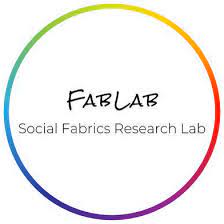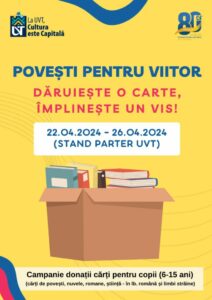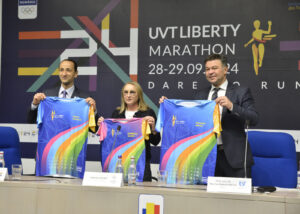Social Fabrics Research Lab (FabLab) is a laboratory for research, development and innovation in computational social sciences, but also a center for personal and professional training for students. Its mission is to create an openness to the field of social science research from a general but also specialized public, to ensure that this research is relevant and useful.
FabLab aims to bring together diverse fields, from social sciences, business, government and academia to user experience, with the aim of bringing a multidisciplinary approach to research. The main purpose of the FabLab is to manifest the impact but also to empower the civic society, combining the potential of the existing structures in the Fablab and in the associated communities.
1. FabLab at Women in Data Science Central and Eastern Europe & Romania
On March 8, the team Social Fabrics Research Lab a Faculties of Political Sciences, Philosophy and Communication Sciences co-organized Women in Data Science Central and Eastern Europe and Women in Data Science Romania. Together, the two events attracted more than 2,000 people from the region.
event WIDS CEE, co-organized together with WiDS Ambassadors from Austria, Hungary, Croatia, Slovenia, Bosnia and Herzegovina and Serbia, Romania was represented by:
- Alexandra Stefanescu, Chief Technology Officer, Code for Romania, spoke about "Opening Up The Public Sector to Open Data"
- Dr. Diana Andone, Director, eLearning Center from Politehnica Timisoara, spoke about "The impact of data in culture and creative industries (Jezca Collection, Spotlight Heritage Timișoara)"
- Caesar Panait, Head of Digital Policy, Europuls – Center of European Expertise, spoke about "Data in Artificial Intelligence - How to better safeguard human rights?"
- Ioana German, PhD student & Data Scientist, University of Bristol, spoke about "Data science meets cell biology"
- Diana Mardarovici, General Counselor of Bucharest, spoke about the progress of the Romanian capital in the digitization process
- Dr. Silvia Fierescu from UVT moderated the "Data Science in Government" panel, which had as guests Brigitte Lutz (AT), Data Governance Coordinator, City of Vienna; Eszter Kabos (HU), Economist, Senior Advisor, Municipality of Budapest; Diana Mardarovici (RO), General Councillor, Bucharest City Hall; Marianna Pekar (HU/NZ), Principal Data Scientist, Social Wellbeing Agency, New Zealand; Tijana Blagojev (RS), Co-organizer, R-Ladies Belgrade and Caesar Panait (RO), Affiliated expert on Digital Policies, Europuls.
Part of the WiDS CEE event can be watched here: https://fb.watch/4x5DeDH-wo/.
event WiDS Romania, co-organized with the think tank for national development, 360, where the UVT FabLab team was a communication partner, participated successful women from the government, business, tech and education sectors, in dialogue about the status and potential of the field of Data Science in the country, for young people, and for decisions and public policies informed by data and evidence.
The recording of the WiDS RO event can be accessed here: https://www.facebook.com/WoltersKluwerRomania/videos/184508333172981.
The UVT FabLab Communication Team consists of:
- Lect. university Dr. Silvia Fierescu (Women in Data Science Ambassador for Romania)
- Teodora Nan, third year student, Communication and Public Relations, Team Coordinator
- Andrei Dodea, first year MA student, Information Systems, Project Manager
- Larisa Sofia, second year student, Digital Media, Web Designer
- Ianis Rusitoru, second year student, Digital Media, Social Media Manager (Twitter)
- Oana Draghici, third year student, Advertising, Social Media Manager (LinkedIn)
- Miruna Lucan, second year student, Digital Media, Social Media Manager (Instagram)
- Elisabeth Varvaroi, second year student, Digital Media, Graphic Designer
- Teodora Hanes, second year student, Digital Media, Graphic Designer
- Roxana Leaha, second year student, Digital Media, Digital Content Creator
- Cristina Danilet, second year student, Digital Media, Digital Content Creator
- Ioana Haulica, second year student, Digital Media, Babeș Bolyai University, Digital Content Creator
- Lorena Davidesc, second year student, Digital Media, Digital Content Creator
- Rebecca Peca, third year student, Advertising, Digital Content Creator
- Andrada Cocoș, third year student, Advertising, Digital Content Creator
- Mădălina Nodea, third year student, Advertising, Digital Content Creator
- Denisa Molnar, third year student, Communication and Public Relations, Digital Content Creator
You can join the active and growing Women in Data Science Central and Eastern Europe community on social media.
Facebook: https://www.facebook.com/WiDS.CEE
Twitter: https://twitter.com/WIDSCEE
LinkedIn: http://bit.ly/wids-cee-2021
Instagram: https://www.instagram.com/widscee/
2. FabLab at the GESIS Fall Seminar in Computational Social Science
Lect. university Dr. Silvia Fierescu and the student Ianis Rusitoru, second year student in the Digital Media program of the Department of Philosophy and Communication Sciences, were invited to teach the course Social Network Analysis in R la GESIS Fall Seminar in Computational Social Science organized by Leibniz Institute for the Social Sciences, Germany.
The Fall Seminar in Computational Social Science is usually held at GESIS, Cologne, in September. Its courses are taught by both GESIS and international experts and cover methods and techniques for collecting and analyzing digital behavioral data ("big data"), for example Machine Learning or Text Mining. The lectures in each course are supplemented by practical exercises that give participants the opportunity to apply these methods to data. All courses are held in English.
The Fall Seminar in Computational Social Science is aimed at social and data scientists and digital humanities researchers who collect and analyze data from the web, social media, or digital text archives.
3. FabLab and Global Shapers Hub Timisoara
World Economic Forum approved the establishment Global Shapers Hub Timisoara. A team of five students and alumni of UVT, together with the Founding Curator, lect. university Dr. Silvia Fierescu and support from seven local organizations, founded the country's second Global Shapers Hub and joins the global community of over 400 GSH organizations with a mission to create new generations of free and sustainable social impact. Global Shapers Hub Timisoara will be launched soon, with a program of local social change actions and international training of 20 leaders between 18 and 27 years old from Timisoara.
The founding team of GSH Timișoara consists of Andrei Dodea, Cristina Barna, Alexandru Rosca (MY FACE), Teodora Nan si Alexandru Dobrescu (BA and MA PFC). Founding Curator with a one-year mandate is Dr. Silvia Fierescu (PFC). The partner organizations of GSH Timișoara are: AIESEC, Banat IT, Continental Automotive Romania, AID NGO, ROSENC, ऐप्पल स्टोर से टॉप शॉट स्नाइपर ड्यूल्स प्राप्त करें, Smart City Association.
4. FabLab and Digital Society Podcast
Inside the project Digital Society Podcast al Social Fabrics Research Lab, research, development and innovation laboratory within Faculty of Political Sciences, Philosophy and Communication Sciences, we launched series 5, Policy & Tech (in Romanian), where we talk with the founder and CEO Code for Romania, Bogdan Ivanel And with Valentin Muresan, the personal adviser of the Mayor of Timisoara, Dominic Fritz, about digitization of local and national public administration.
You can follow us online:
Website:https://www.digitalsocietypodcast.com/
YouTube:https://www.youtube.com/watch?v=lLjkPBsIgXs
Facebook:https://www.facebook.com/digitalsocietypodcast
Instagram:https://www.instagram.com/digitalsocietypodcast/
Buzzsprout:https://www.buzzsprout.com/1240103
Spotify: https://open.spotify.com/episode/3QGDvhS6TM1PItxi9YkjJ2?si=FdL0TbccSneNu2oUvRxuCQ&nd=1
5. FabLab at ECPR
Dr. Silvia Fierăscu, founder and Director of FabLab, participated as a Recurrent Invited Lecturer at the international research methods and techniques school of the European Consortium for Political Research, ECPR Virtual Winter Methods School, where she taught the Social Network Analysis course to participants from 19 countries and 28 institutions.
Participants came from academic and public policy institutions in Belgium, Denmark, Netherlands, Spain, Poland, Canada, Germany, UK, Norway, South Korea, Sweden, France, Switzerland, USA, Ireland, Austria, Croatia, Lithuania.
The following institutions were represented: Université Libre de Bruxelles, University of Copenhagen, University of Leiden, Elcano Royal Institute, Incontro Training, Université Laval, Universität Greifswald, KU Leuven, University of Zagreb, London School of Economics, Antwerp University, Hamburg University, Norwegian Institute of International Affairs, Korea Advanced Institute of Science and Technology, Lund University, University of Gothenburg, Bielefeld University, Council of Europe, ETH Zurich, Fox School of Business at Temple University, University College Dublin, University of Potsdam, Central European University , University of Stirling, Max Planck Institute for the Study of Societies, Kaunas University of Technology, Queen Mary University of London.
Dr. Fierăscu and Teaching Assistant Rafiazka Hilman (Ph.D. Network and Data Science at Central European University) taught Social Network Analysis so that participants could apply the methodology to better understand:
- the phenomenon of revolving doors between government agencies and the financial industry;
- water governance in Malawi;
- the evolution of the web of 'security' discourses;
- online interactions between far-right groups;
- the politicization of the EU trade agreement negotiations;
- how information or contestation spreads in a political system;
- monitoring and evaluation of a social cash transfer program;
- actors and discourses about enlargement in European parliaments;
- political agenda setting processes;
- land use policy in Sweden;
- the networks of organizations and relevant actors (and the decision-making arenas in which they participate) that have had an influence on policy design.
In March, FabLab hosted the 7th edition of the FabLab Seminar Series, with Dr. Tatjana Kecojevic, founder and Director of Sister Analyst, Serbia as her guest. The seminar was interactive and Dr. Kecojevic taught participants how to prepare replicable research reports using R software and the GitHub platform to make their empirical research open, transparent and replicable.
6. FabLab Seminar Series March
The recording of the event can be accessed here: https://www.facebook.com/events/1540710839456135
*** About the seminar series ***
Seminar Series Social Fabrics Research Lab are regular public events, about cutting-edge research in the field of network and data science, with applications to social, political, economic and cultural issues, where both young and experienced researchers, Romanian and international, present their most interesting projects. The events are organized by FabLab at West University of Timişoara, in collaboration with Center for Public Policies from Western University and Banat IT. All FabLab events are free and open to the public.
*** About our guest ***
Dr. Tatjana Kecojevic is a long-time user of R, with a PhD in Statistics from Manchester University. He has spent many years working in the UK academic sector as a university lecturer and has published an extensive number of articles and papers in the field of quantile regression.
“I love sharing knowledge and I use R to create various platforms with educational materials that can help people learn to extract information from data. Surprisingly, I am an enthusiastic R user and in addition to my involvement I support women in STEM related activities. I am dedicated to creating an inclusive culture, developing initiatives that support all underrepresented groups in the Data Science community.”
*** About the event ***
We've all seen research presented as either a PowerPoint, blog post, book, or academic journal article. If the figures and tables of results presented cannot be replicated, we limit the scope of understanding of knowledge resulting from scientific studies. Allowing others to replicate, test, reuse, extend, and build on published research results can accelerate the rate at which scientific development drives cultural and technical innovation.
Adopting and applying open and transparent approaches to research is essential to truly rigorous analysis, and adds to the material value of research. With these in mind, the presentation of the code, data and algorithms used to generate the results should be available for review and possible connectivity to wider research projects.
In this meeting, Dr. Tatjana Kecojevic introduced us to open source software R and the GitHub platform, which could serve as a tool for reproducible research. R has become central to the research itself and the communication of its results to the wider community. It is free public domain software available to anyone who wants to discover, learn, explore, experiment, extend and share algorithms for scientific research projects. Dr. Kecojevic showed us how to use the RStudio IDE for R, from its installation, to customizing RStudio and file navigation. RStudio supports working with Git, an open source distributed version control system that is easy to use when combined with GitHub, a Git repository web hosting service, and will familiarize us with best practices when incorporating the use of Git with a project workflow in R.
Dr. Kecojevic showed us how to turn research analyzes into high-quality documents and presentations with R Markdown. Reproducible reports were designed by automating the reporting process, and a modern approach to telling the story of the data was presented. The knowledge gained from this discussion helped to create reports directly from the R code, allowing the documentation of the analysis and its results in the form of HTML, pdf, slideshow or Microsoft Word document.
By presenting some simple but informative examples, it illustrated how reproducible research can become common practice for researchers when using a simple and freely available tool.
This talk provided everyone in attendance with effective and engaging ways to communicate their research findings.





